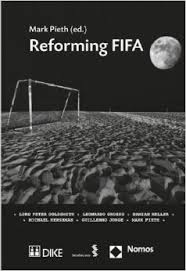Day 1: The impact of the revised World Anti-Doping Code on the work of National Anti-Doping Agencies
Day 2: The “Athlete Patient” and the 2015 World Anti-Doping Code: Competing Under Medical Treatment
Day 3: Proof of intent (or lack thereof) under the 2015 World Anti-Doping Code
Day 4: Ensuring proportionate sanctions under the 2015 World Anti-Doping Code
On
1 January, a new version of the World Anti-Doping Code (WADC or Code) entered
into force. This blog symposium aims at taking stock of this development and at
offering a preliminary analysis of the key legal changes introduced. The
present blog will put the WADC into a more general historical and political
context. It aims to briefly retrace the emergence of the World Anti-Doping
Agency (WADA) and its Code. It will also reconstruct the legislative process
that led to the adoption of the WADC 2015 and introduce the various
contributions to the blog symposium.More...
Editor’s note
Wil is working as a lawyer since 1980. He
started his legal career at Rechtshulp Rotterdam. Later on he worked for the
Dutch national trade union FNV and law firm Varrolaan Advocaten. Currently he
is participating in the Labour Law Section of lawfirm MHZ-advocaten in Schiedam
in the Netherlands. He is also a member of a joint committee advising the government
in labour issues.
Since 1991 he is dealing with the labour issues
of the trade union for professional football players VVCS and cyclists’ union
VVBW. Since 2002, he works for FIFPro, the worldwide union for professional
football players based in Hoofddorp in the Netherlands. He is involved in many
international football cases and provides legal support for FIFPro members all
over the world. Wil was also involved in the FIFPro Black Book campaign on
match fixing and corruption in Eastern Europe. More...
Editor's note
Piotr is an intern at the ASSER International Sports Law Centre.
Introduction
On 24 July the Court of Arbitration
for Sport (CAS) issued its decision in the proceedings brought by the Indian
athlete Ms. Dutee Chand against the Athletics Federation of India (AFI) and the
International Association of Athletics Federations (IAAF) in which she
challenged the validity of the IAAF Regulations Governing Eligibility of
Female with Hyperandrogenism to Compete in Women’s Competition (Regulations). The Regulations were
established in 2011 as a response to the controversies surrounding South
African athlete Caster Semenya (see e.g.
here, here, and here), and for the purpose of
safeguarding fairness in sport by prohibiting women with hyperandrogenism, i.e. those with excessive levels of
endogenous (naturally occurring) testosterone, from competing in women athletics
competitions. Owing to the subject-matter that the Regulations cover, the case
before the CAS generated complex legal, scientific and ethical questions. The
following case note thus aims at explaining how the Panel addressed the issues
raised by the Indian athlete. It follows a previous blog we published in December 2014 that
analysed the arguments raised in favour of Ms. Chand. More...
Star Lawyer Jean-Louis Dupont is almost
a monopolist as far as high profile EU law and football cases are concerned.
This year, besides a mediatised challenge against UEFA’s FFP regulations, he
is going after FIFA’s TPO ban on behalf of the Spanish and
Portuguese leagues
in front of the EU Commission, but also before the Brussels First Instance
Court defending the infamous Malta-based football
investment firm Doyen Sport. FIFA and UEFA’s archenemy,
probably electrified by the 20 years of the Bosman ruling, is emphatically trying to
reproduce his world-famous legal prowess. Despite a first spark at a success in
the FFP case against UEFA with the Court of first instance of Brussels sending
a preliminary reference to the Court of Justice of the EU (CJEU), this has
proven to be a mirage as the CJEU refused, as foretold, to answer the questions of the Brussels Court,
while the provisory measures ordered by the judge have been suspended due to
UEFA’s appeal. But, there was still hope, the case against FIFA’s TPO ban, also
involving UEFA and the Belgium federation, was pending in front of the same
Brussels Court of First Instance, which had proven to be very willing to block UEFA’s
FFP regulations. Yet, the final ruling is another disappointment for Dupont
(and good news for FIFA). The Court refused to give way to Doyen’s
demands for provisional measures and a preliminary reference. The likelihood of
a timely Bosman bis repetita is
fading away. Fortunately, we got hold of the judgment of the Brussels court and
it is certainly of interest to all those eagerly awaiting to know whether
FIFA’s TPO ban will be deemed compatible or not with EU law. More...
FIFA’s freshly adopted TPO ban entered into
force on 1 May (see our Blog symposium). Though it is difficult to
anticipate to what extent FIFA will be able to enforce the ban, it is likely
that many of the third-party investors will try to have recourse to alternative
solutions to pursue their commercial involvement in the football transfer
market. One potential way to circumvent the FIFA ban is to use the proxy of
what has been coined “bridge transfers”. A bridge transfer occurs when a club
is used as an intermediary bridge in the transfer of a player from one club to
another. The fictitious passage through this club is used to circumscribe, for
example, the payment of training compensation or to whitewash a third-party
ownership by transforming it into a classical employment relationship. This is
a legal construction that has gained currency especially in South American
football, but not only. On 5 May 2015, in the Racing Club v. FIFA case, the Court of Arbitration for Sport (CAS)
rendered its first award involving directly a bridge transfer. As this practice
could become prevalent in the coming years we think that this case deserves a
close look. More...
Editor's note: This is a short introduction written for the special Issue of the Maastricht Journal of European and Comparative Law celebrating the 20 years of the Bosman ruling and dedicated to the new frontiers of EU law and Sport (the articles are available here). For those willing to gain a deeper insight into the content of the Issue we organize (in collaboration with Maastricht University and the Maastricht Journal) a launching event with many of the authors in Brussels tomorrow (More info here).More...
Editor’s
note: Chuck Blazer declined our official interview request but thanks to some trusted
sources (the FIFA indictment and
Chuck’s testimony) we
have reconstructed his likely answers. This is a fictional interview. Any resemblance with real facts is purely coincidental.

Mr
Blazer, thank you for agreeing to this interview, especially considering the
circumstances. How are you doing?
I am facing ten charges concerning, among others,
conspiracy to corrupt and money laundering. But apart from that, I am doing
great (laughs)!
It is
good to know that you have not lost your spirit. And since you’ve been involved
in football, or as you call it soccer, for years could you please first tell us
what was your career at FIFA and its affiliates like?
Let me see… Starting from the 1990s I was employed by and
associated with FIFA and one of its constituent confederations, namely the
Confederation of North, Central American and Caribbean Association Football (CONCACAF).
At various times, I also served as a member of several FIFA standing
committees, including the marketing and television committee. As CONCACAF’s
general secretary, a position I proudly held for 21 years, I was responsible,
among many other things, for negotiations concerning media and sponsorship
rights. From 1997 to 2013 I also served at FIFA’s executive committee where I
participated in the selection process of the host countries for the World Cup
tournaments. Those years at the helm of world soccer were truly amazing years
of travel and hard work mainly for the good of the beautiful game. I might add
that I even managed to document some of my voyages on my blog. I initially
called it “Travels with Chuck Blazer” but Vladimir (Putin) convinced me to
change the name to “Travels
with Chuck Blazer and his Friends”. You should check it out.
More...
Editor’s note: This short book review will be
published in a different format in the International Sports Law Journal, due to
its timeliness we decided to reproduce it here.
Reforming
FIFA, or Not
Antoine Duval
Book Review: Mark Pieth
(ed.), Reforming
FIFA, Dike Verlag, St. Gallen, 2014, 28.00 CHF, p.178

This
book looks back at the work of the Independence Governance Committee
(IGC). This Committee, constituted in 2011, had as
primary objective to drive a reform process of FIFA initiated by its President
Sepp Blatter. After ordering from the Swiss anti-corruption expert Mark Pieth,
a report
on the state of FIFA’s governance, FIFA decided to mandate him with the leadership
of a consulting body composed of a mix of independent experts and football
insiders, which would be accompanying and supervising the internal reform
process of FIFA. The IGC was officially dissolved
at the end of 2013, after completing its mandate. The book is composed of eight
chapters, written by former members of the IGC, including former chairman Mark
Pieth. In addition to the chapters, it includes the different reports
(available here,
here
and here)
submitted by the IGC to FIFA across the years. In the words of Pieth, this
account is “fascinating because it gives a hands-on, realistic perspective of
the concrete efforts, the achievements and the remaining challenges in the
struggle for the reform of this organization [FIFA], avoiding the usual
glorification or vilification.”[1]
This review will first summarize the core of the account of the FIFA reform
process provided by the book, before critically engaging with the outcome of
the process and outlining the deficiencies that culminated on 29 May 2015 with
the re-election of Sepp Blatter as FIFA president.More...
Introduction
On 1 April 2015, the new FIFA Regulations on
Working with Intermediaries (hereinafter referred as the Regulations) came into
force. These Regulations introduced a number of changes as regards the division
of competences between FIFA and its members, the national associations. A particularly
interesting issue from an EU competition law perspective is the amended Article 7 of the Regulations. Under paragraph 3, which regulates
the rules on payments to intermediaries (also previously referred to as ‘agents’), it is recommended that the
total amount of remuneration per transaction due to intermediaries either being
engaged to act on a player’s or club’s behalf should not exceed 3% of the
player’s basic gross income for the entire duration of the relevant employment
contract. In the case of transactions due to intermediaries who have been
engaged to act on a club’s behalf in order to conclude a transfer agreement, the
total amount of remuneration is recommended to not exceed 3% of the eventual
transfer fee paid in relation to the relevant transfer of the player.More...
Introduction: FIFA’s TPO ban and its compatibility with EU competition law.
Day 1: FIFA must regulate TPO, not ban it.
Day 2: Third-party entitlement to shares of transfer fees: problems and solutions
Day 3: The Impact of the TPO Ban on South American Football.
Day 4: Third Party Investment from a UK Perspective.
Editor’s note: Finally, the last blog of our
TPO ban Symposium has arrived! Due to unforeseen circumstances, FIFA had to
reconsider presenting its own views on the matter. However, FIFA advised us to
contact Prof. Dr. Christian
Duve to author the eagerly awaited blog on their behalf. Prof. Dr. Christian Duve is a lawyer
and partner with Freshfields Bruckhaus Deringer LLP and an honorary professor
at the University of Heidelberg. He has been a CAS arbitrator until 2014. Thus, as planned, we will conclude
this symposium with a post defending the compatibility of the TPO ban with EU
law. Many thanks to Prof. Dr. Duve for having accepted this last-minute
challenge! More...